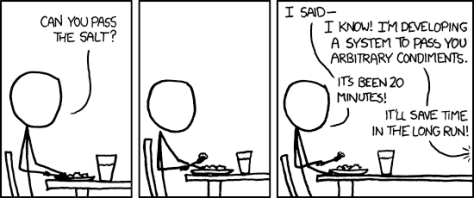In response to 7 Reasons You Don’t Want To Work in the Video Game Industry and Ten Reasons *Not* to Become an Indie Game Developer, here are selected reasons why you should never jump ship and become a game dev lecturer, or have the audacity to think you could ever teach it, having never been “in” the Industry.
NOTE: Satire mode is definitely turned on, even though many sentiments expressed here have been observed if not endorsed by the author. I’ll write a companion piece on why you SHOULD be a game dev lecturer when I…er…can think of arguments in favour. 🙂
- It’s a Sisyphean Task
- If you left you failed
- Who the Hell do you think you are?
- So, you play games all day…?
- Slow but Sure
- Punished by Success
- The Baby who cries loudest gets the Milk
- It’s a Secure Job with a Pension
- Shit from all sides
In that it’s an “endless and unavailing” labour, primarily because of the moving goal posts of technology. Industry legends, like David Braben, report universities “five years out of date” with old technology and too slow changes in curricula. Not true, of course, but if expectations are set ridiculously high, you’ll never meet them. Hardware is often not cutting-edge, but even developers have budgets. Access to Industry relevant hardware and software is often restricted by the manufacturer anyway: don’t even think about Nintendo hardware; the 360 is 6+ years old and we’re still restricted to cut down software; only Sony offers proper hardcore access to Industry-level PS3/PSP SDKs if you can afford them. So, universities can hardly be criticised for not having the latest kit.
It still comes something of a shock to many academics when made aware that the life-expectancy of a career in games is 5-6 years – two triple A titles if you’re lucky – with a majority high burn out rate balancing a few people who’s careers span decades. So, if you left the Industry to teach, seen as possibly the best preparation for game dev lecturers by the Industry, you MUST have left because you couldn’t cut it, wanted more (or some?) time with your family, weren’t able to produce 29 hours of work a day; basically you’re a wuss! As soon as you leave active development your skills will quickly date, your Industry contacts will dry up – quit themselves, get promoted and be too busy, or emigrate to Canada – leaving you wondering where they all went. Oh, and new colleagues, fellow lecturers, will eye you suspiciously from their ivory towers, condemning you for dirtying your hands and consorting with Mammon.
Lecturers who are not Industry washouts are either game dev wannabes, who never made it, but would clearly have been Will Wrights if they’d just gotten that break, or didn’t risk their illusions by actually trying to make games for public scrutiny. Failing this, you’re a cynical “bums on seats” sell out, just trying to save your own job by mis-selling courses to gullible school leavers. Hell, games are just programs with sound, art and shit anyway, so any competent IT professional can teach it, right? And the department/school/faculty is at risk, with applications for Computer Science and even the watered down IT and Computing degrees massively down, despite a huge and increasing gap in recruitment for IT professionals. For 80% of graduates, who don’t get kicked out or leave due to poverty or disgust, or their own unrealistic expectations of you or their own ability, there will be loads of IT jobs as they will never get a career in game development anyway, while the Industry fights off better paid, family friendly, if less glamorous alternatives, to cream off the best graduates.
Even more misunderstood than QA testers, lecturers don’t get much time to play, let alone make games themselves. Teaching takes a lot of time, energy and personal resources. Contrary to the time-worn adage “if you can’t do, teach”, competence in educating even enthusiastic students is not implied by knowledge of the field. However,
Although David Braben’s criticism of slownessis an exaggeration HE is cautious by nature.
Class sizes and lack of resources
Resources
Given layoffs, course cuts, and a cynical attack on pensions and working conditions in the UK’s Education sector, that crunch-laden dev job doesn’t look so bad now.
Industry will hate you for not preparing students for realistic working conditions, students will hate you if you try.



